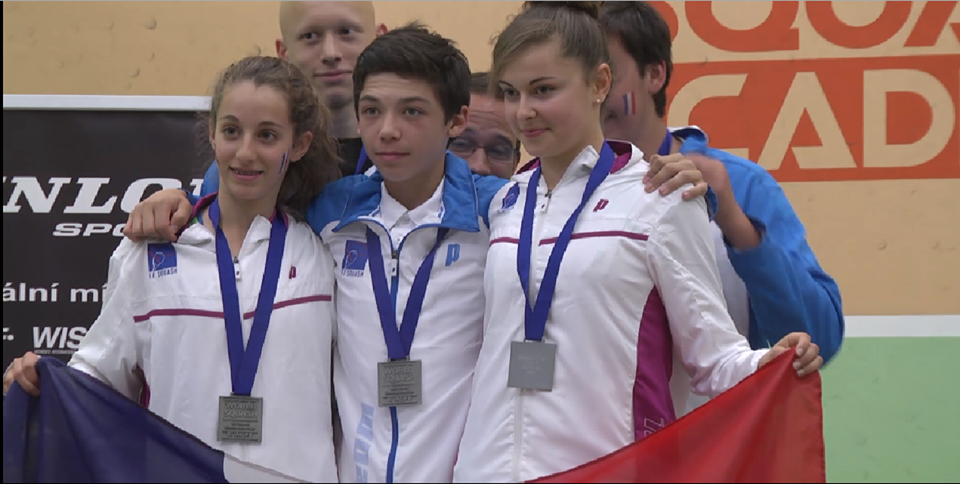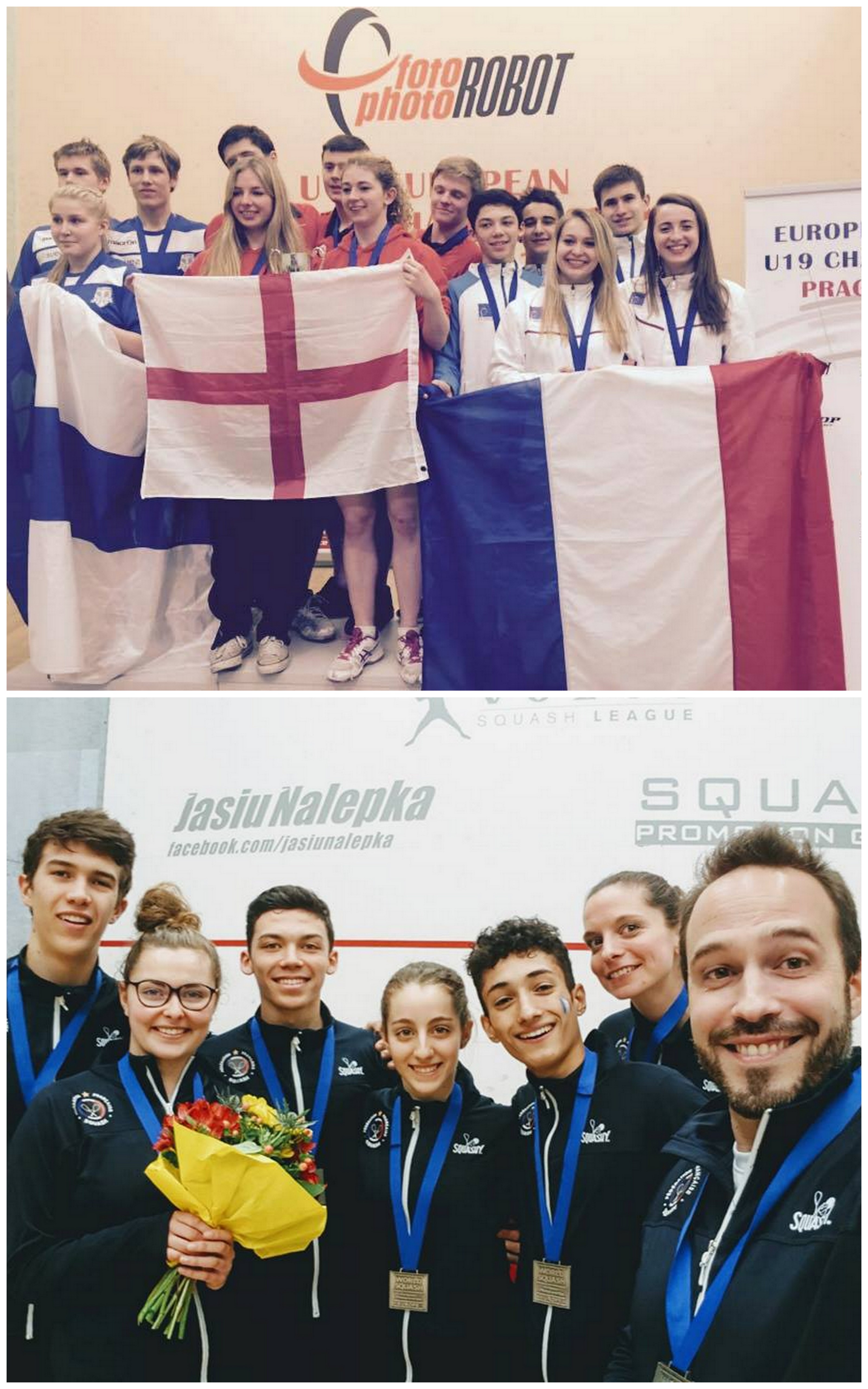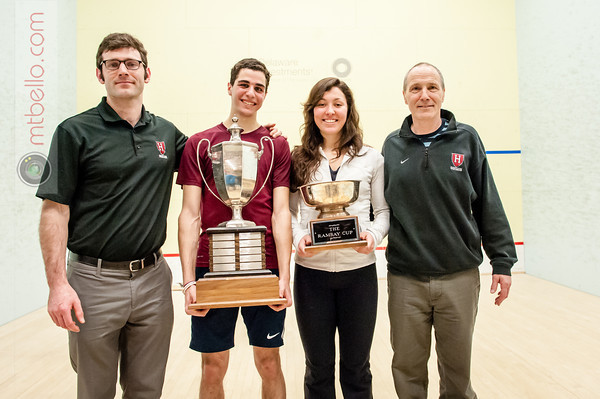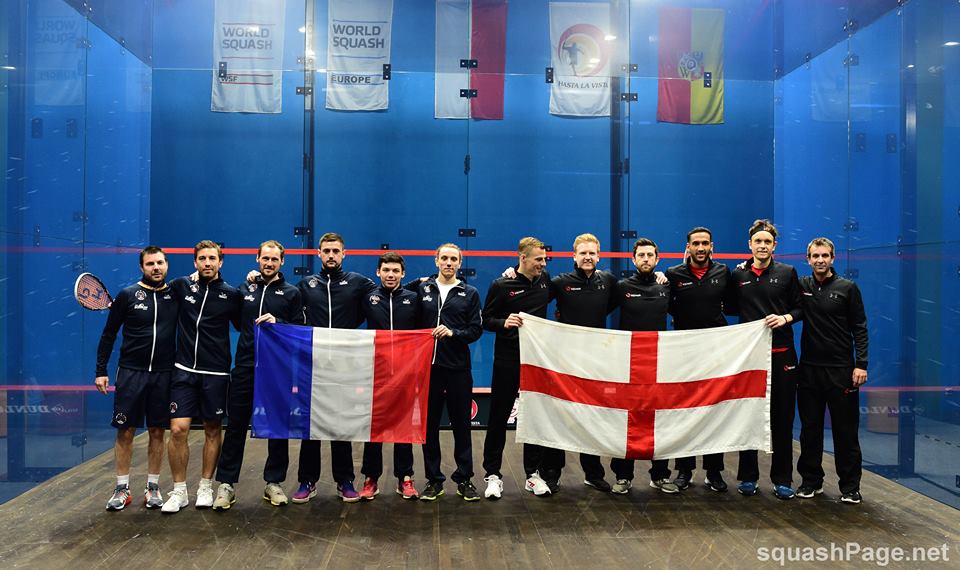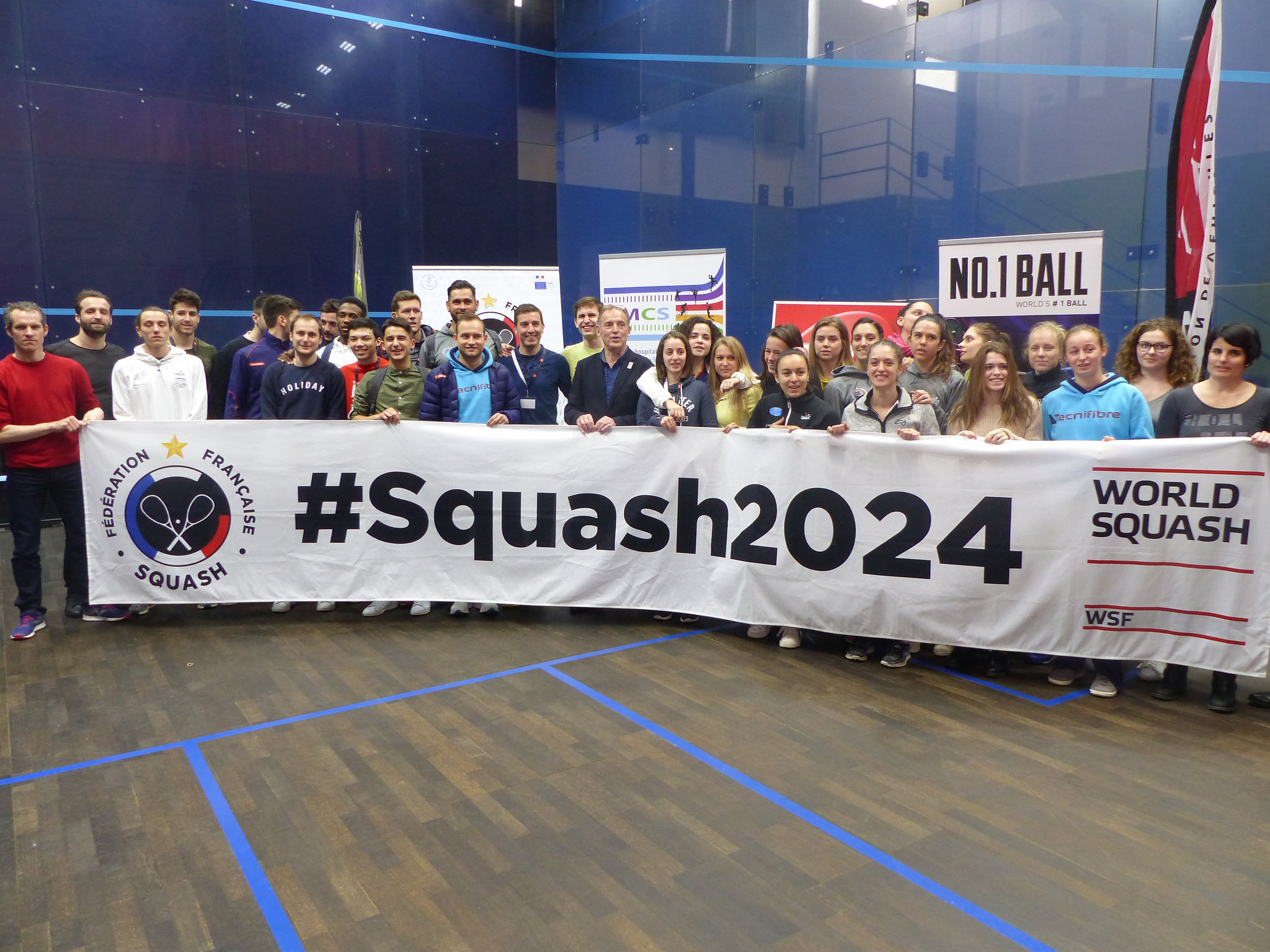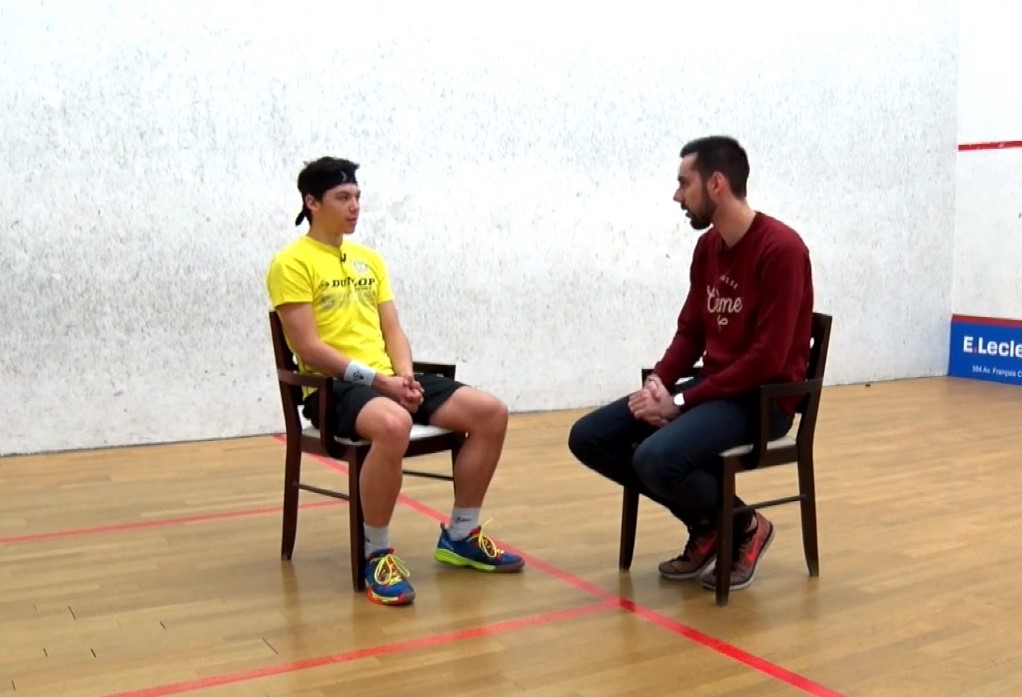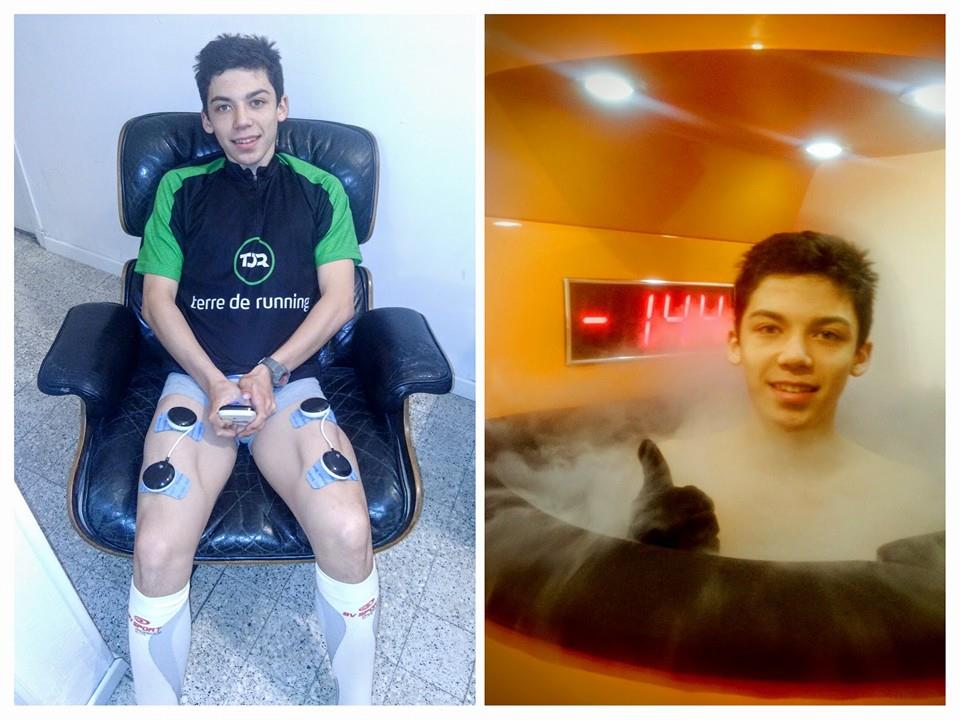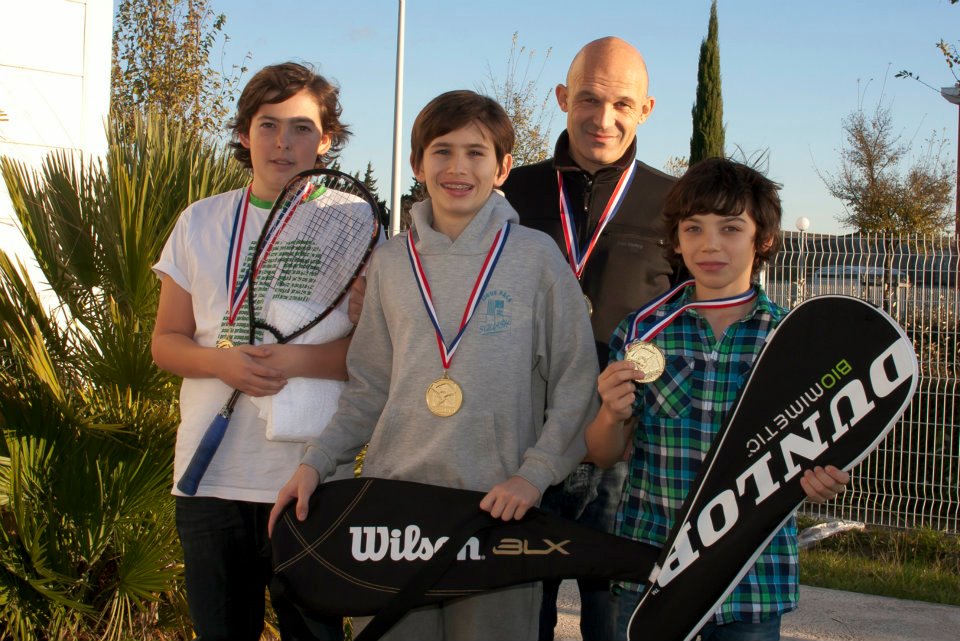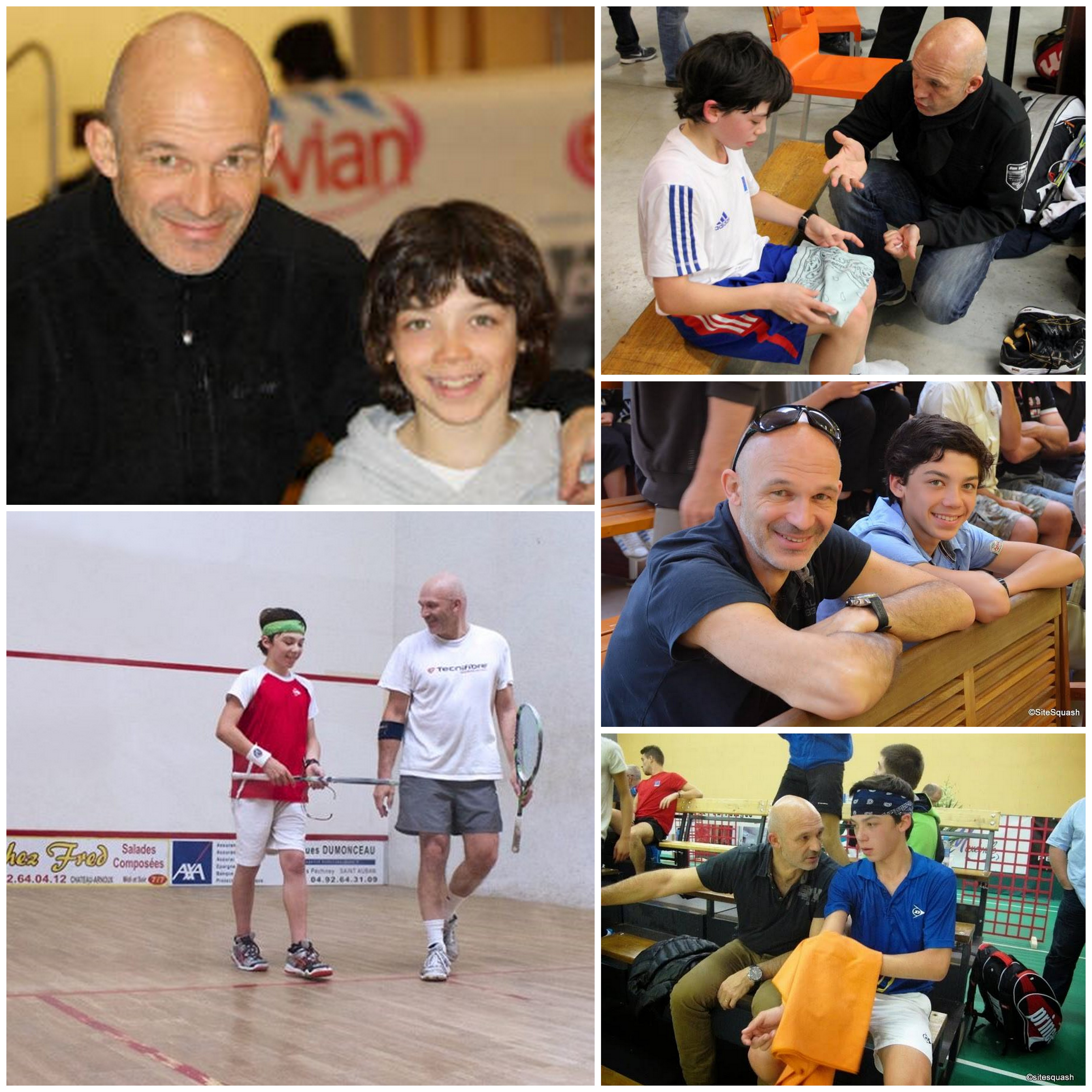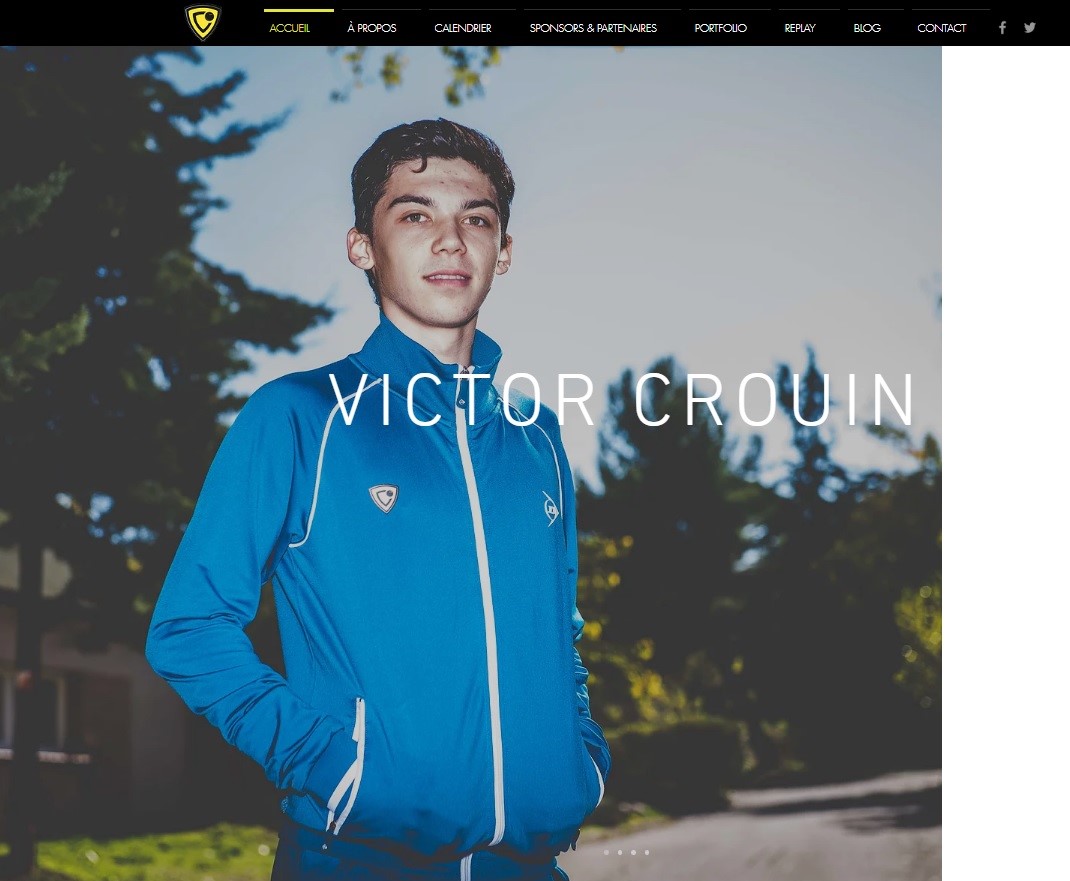Actus
VICTOR CROUIN: "I LOVE TO PLAY FOR FRANCE MORE THAN ANYTHING" (PART 2)
Événements 01/06/2018In a few weeks (on the 16th of June), Victor Crouin will turn 19 years old and will definitely put his junior career behind him. He ended it with a second European Junior Championship title, completing a record list that is only comparable to Grégory Gaultier's and Camille Serme's as far as French squash goes.
According to Victor, it is during those years that a player can “maximize his potential. Thanks to the junior tournaments, I learned a lot about myself, and I also learned how to push my limits and to bounce back after a loss. What I went through during these nine years is so embedded in my memory that I could tell you everything!” We took him at his word and asked him to open his memory box. After focusing on his achievements in the first part, we cover other topics today: French national teams, his leaving to the US, the recipe for success and the key part played by his father.
By Jérôme Elhaïk
![]() (Cliquez pour lire l'article en français)
(Cliquez pour lire l'article en français)
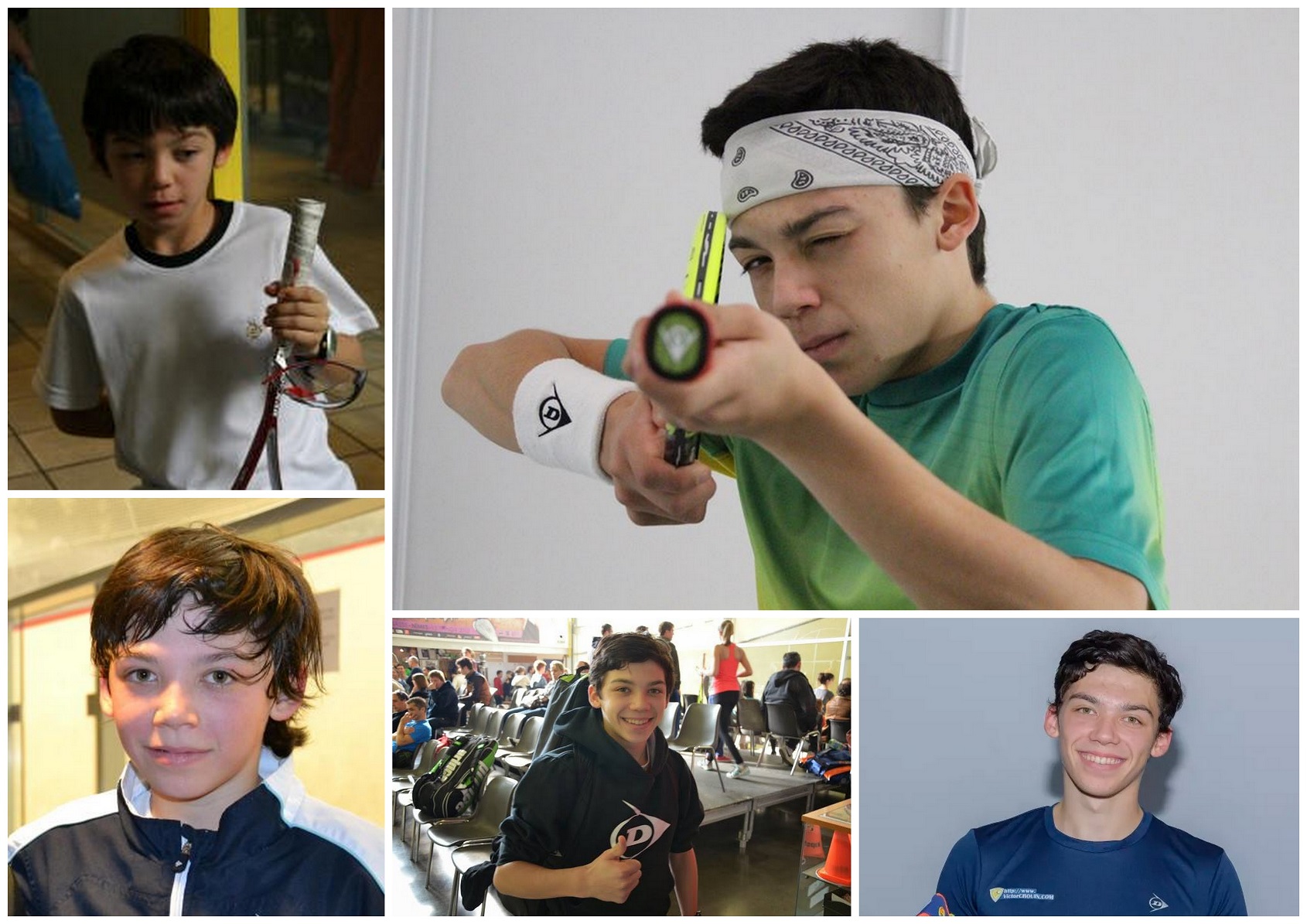
(Photo credits: SiteSquash, OFJ 2012, Victor Crouin, Salming Squash)
Read the first part VICTOR CROUIN: "JUNIOR TOURNAMENTS ARE LIKE A SCHOOL OF LIFE" (PART 1)
CHAPTER 5 - THE FRENCH NATIONAL JUNIOR TEAMS
|
The debuts On the 22nd of April 2011, Victor Crouin put on the French national jersey for the first time. It was at the 5 Nations tournament in Guilford (England), in the U13 category. “I'd been beaten very comprehensively,” he remembers. In fact he lost to England's Charlie Lee 11-9, 11-5, 11-6, which is not quite the kind of drastic loss his opponents often underwent against him in juniors. Victor was not lying when he said his memories from his junior years were rather thorough: he recalls that a team from London was featuring in U13, “because Scotland did not have a girl.” It's against them that the 11-year old got his first win with Les Bleus, against Samuel Exelby. It certainly was not to be the last one. 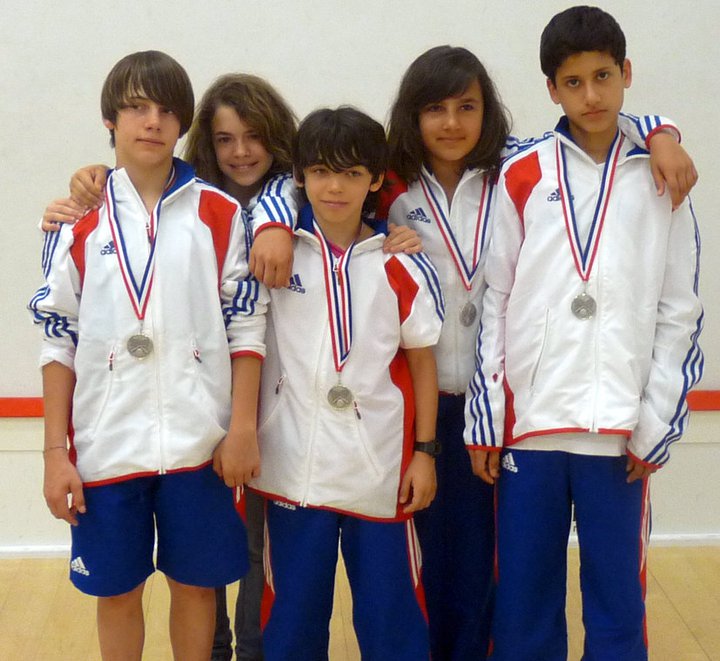
For his debut with the French national team, Victor Crouin (here alongside Jules Cremoux, Lauriane Maingot, Lola Rodrigues and Rohan Mandil) got a silver medal at the 5 Nations in 2011 (Photo credit: SiteSquash) |
||
|
Invincible England Between 2013 and 2016, Victor took part in four European Championships in his age category (two in U15 and two in U17). He got two silver medals and two bronze. He may have defeated England for his first cap with the senior team a few weeks ago, but France have never beaten their big rivals in a junior team event. They got close a couple of times though, “for example in 2008, with Camille Serme and Grégoire Marche who had both clinched the European individual title,” but also in 2014. Hugo Mandil and Victor both lost their match in 5 games, and overall France scored almost as many points as England - 97 against 99.
Despite the silver medal, the U15 European Team Championship remains a source of disappointment for Victor ... (Photo credit: Victor Crouin) “I did not deliver in the final, losing to Curtis Malik (author's note: he was leading 2-1). I think it is the only time I let the French team down. Having never won a European Team Championship makes sense because England have always had strength in depth and were consistently expected to win. But we had a shot that year, with Hugo, Fanny Segers and Maëlle Fuhrer, and therefore it was disappointing as far as the team goes. I feel like I've always done my share of the work except in this final, and I was very upset after the match.”
|
Best memories Victor mentions the 2015 U19 European Team Championship as one of his best memories. It was his first appearance in this category while he was only 15 years old. “We had a very young team, and there were some tough opponents: Spain, Finland, Ireland, etc. Not to brag but I got a bigger and bigger role within the team as the tournament went on, while I was rather a substitute at the start. All five players had contributed to the bronze medal, which made it even more enjoyable.” Crouin featured in only one of the four first ties, but was picked both in the semis against England and the ¾ playoff match against Wales. He even played the deciding match against Elliott Morris Devred, which he won in 4 games.
But he ranks the 2015 et 2018 campaigns in U19 among his best memories (Photo credits: Victor Crouin) With less hindsight, Victor also ranks 2018 as a good memory. After having kept his individual title, he led the French U19 team to the final, especially with a great display against Czech Republic's Viktor Byrtus in the semi-final. “The silver medal made us very proud. We've known each other for a very long time, and except for Toufik it was our last tournament in juniors. 2017 had been disappointing (author's note: France finished 7th, hence their worst result since 2000), and getting a medal seemed far from easy. There were a lot of emotions on the Saturday, where we won both our quarter and semi-final. We even came up with a battle cry to enhance our team spirit. My teammates knew they could rely on me, and I've played all seven ties. The national team has always been very important for me, playing for France is something I love more than anything! Within a team, everyone has his own personality, but sometimes you have to put the differences aside to move forward as a unit.” "Within a team, everyone has his own personality but you have to move forward as a unit."
|
|
VICTOR CROUIN BY ... MAËLLE FUHRER: "HE ALWAYS KNEW HOW TO CHEER US UP AND TO PUT US BACK ON TRACK"
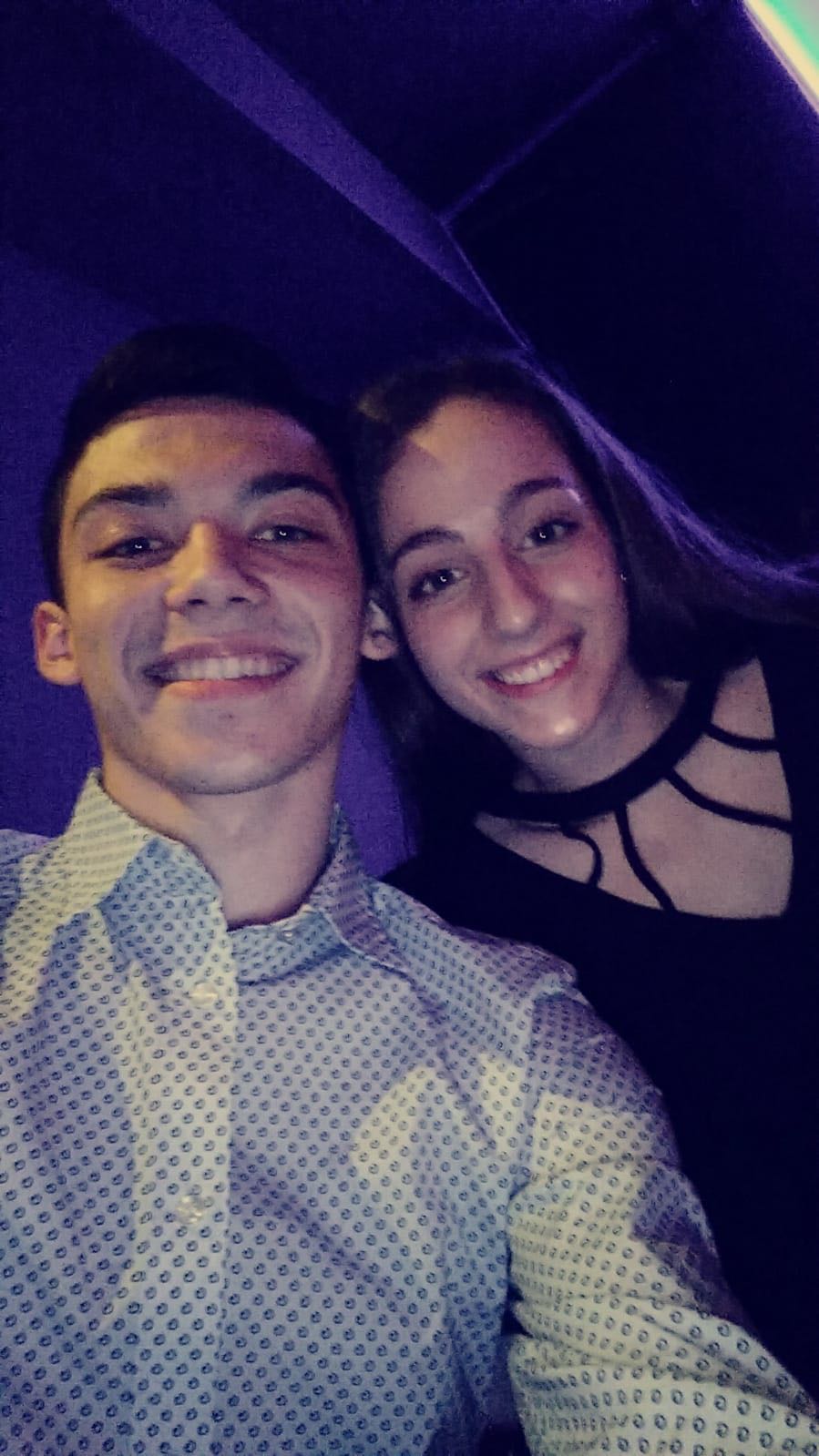
Victor Crouin and Maëlle Fuhrer have played many team events together with the French national junior teams (Photo credit: Maëlle Fuhrer)
“What could I say about Victor? We've known each other for a long time, especially through the French national junior teams. I couldn't have imagined the team without him! Victor was our machine (she laughs), we could always count on him and I loved his team spirit: he did not lose a single match in the last two European Team Championships, but also he always knew how to cheer us up and to put us back on track after a loss. We've shared a lot of good times, but I don't really have a specific one in mind. His nickname is Totor, and we often make fun of his strong buttocks … We also call him arrogant man (I will not explain, but Enzo Corigliano is very good at finding nicknames). It was great to follow and support him at the World Junior Championship in New Zealand, where he got the silver medal. I have absolutely no doubt he is gonna keep on going. I wish him the best in the United States, and I am looking forward to seeing him lift more trophies.”
and also by Enzo Corigliano
“Do I have something to say about Victor? Perhaps I could talk about the way he innocently and delicately blocks his opponents (you can write it, it'll make him laugh!). Seriously, I think he'll reach top 5 in the world, maybe even higher. He deserves it.”
VICTOR CROUIN ... IN NUMBERS
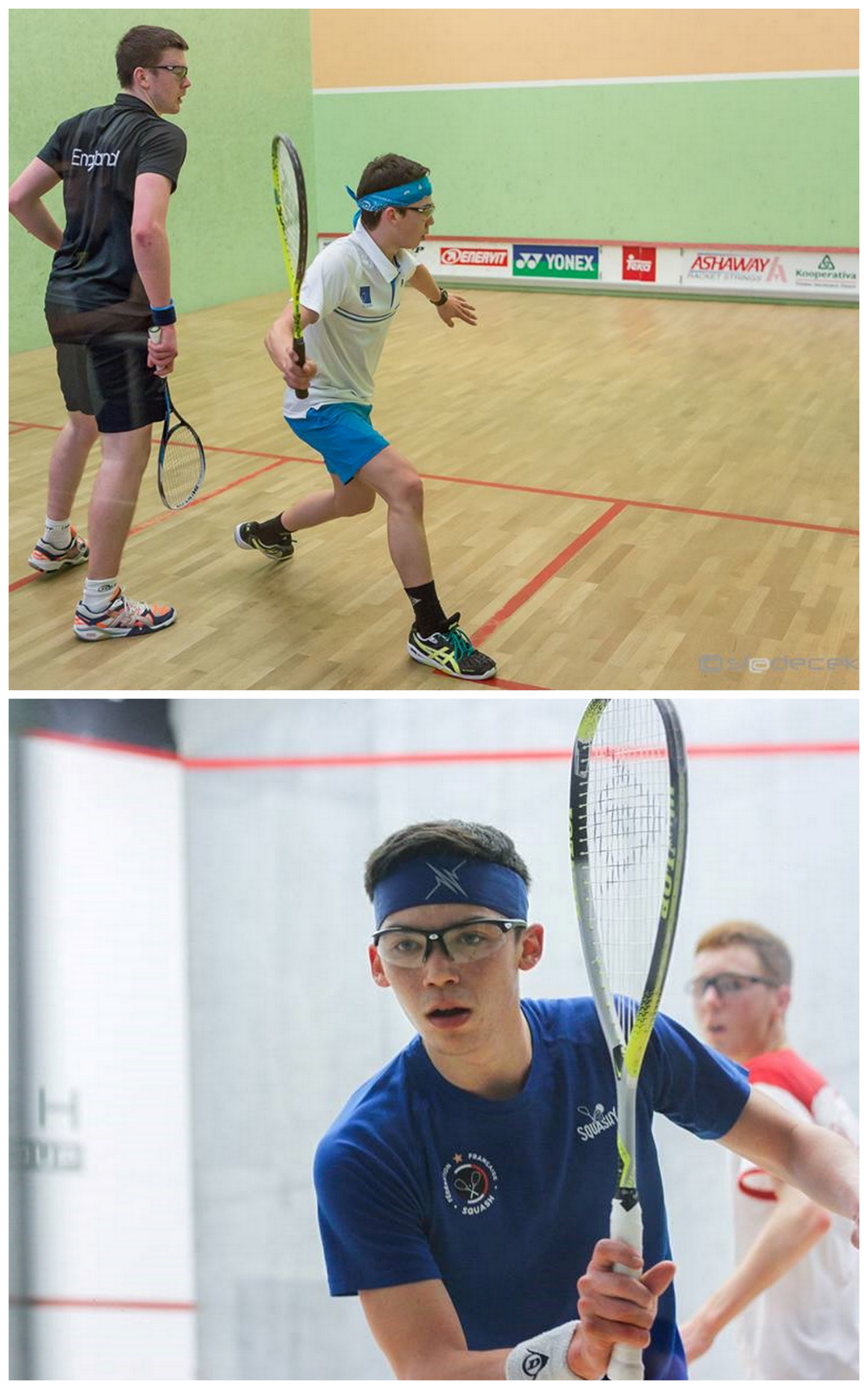
From April 2015 and a loss against Patrick Rooney, Victor Crouin won 35 matches in a row for France, the last one being in the final of the European Team Championship against Tom Walsh (Photo credits: Victor Crouin, European Squash Champs - U19 2018)
Between the 22nd of April 2011 and the 1st of April 2018, Victor Crouin played 63 matches for the various French junior teams (U13, U15, U17 and U19). He only lost six of them (including 5 against England) and especially ended this part of his career with an amazing streak : 35 wins in a row, starting in April 2015 and the match for the bronze medal against Wales. His records in team events are as follows: 11 medals in 13 tournaments (8 silver and 3 bronze), as well as a 5th place in the World Junior Team Championship in 2016.
CHAPTER 6 - IT'S ALREADY TOMORROW
|
Wild wild West American universities have become a popular destination among young squash players from all over the world, especially Egypt. “But the motivation is essentially study-based for them.” says Crouin. “Education is even more important than squash overthere! And there's also the English option, which was chosen by guys like the El Shorbagy brothers and more recently Youssef Soliman.” As far as he's concerned, Victor will follow the footsteps of Ali Farag and Amanda Sobhy, and enroll at the prestigious university of Harvard in September. When and how did he start thinking about it? “Four years ago, Gilly Lane (author's note: coach at the university of Pennsylvania, where French players Marie Stéphan and Mélissa Alvès studied for the last four years) got in touch with me to recruit me. I was too young at the time, but he explained to me how American universities work and continued to follow me: feeling such a support is probably the main thing which made me consider a move. I took the entry exams but didn't pass, and then with revisions for the A-levels and tournaments, I had to put this project on the side. Once I got my A-levels, I decided to take a year off in order to take the exams again and sort all the paperwork out. After the World Junior Championship, several universities contacted me again and in September, I went to the United States to visit Penn and Harvard. My initial choice was Penn I'd say, mainly because of Gilly's interest, but then I discovered Harvard. Not only is it top-class school and squash wise, but the environment is also more international. It's one of the most famous universities in the world, and I could not let this opportunity go.” Besides, Boston is very close to the Atlantic Ocean, which is important for someone who's lived next to the sea for all his life. And if the Frenchman feels homesick and wants to speak French, he'll always be able to go and visit Thierry Lincou: MIT, whose the former world number 1 and world champion is the squash coach, is less than 2 km away. In Harvard, Crouin will work under the supervision of Mike Way, who's been head coach since 2010. Way – whom Ali Farag admires very much – is very highly regarded in the squash world, and was involved with his compatriot Jonathon Power when he was at the top of his game. “Power was one of the players I looked up to when I was young,” says Crouin. “I've talked to Mike Way a few times, and he's already given me a few ideas about things to work on. I am sure he's more than qualified.” For the next four years, Victor will work under the supervision of Mike Way (on the right, with Amanda Sobhy and Ali Farag (Photo credit: mtbello.com) For Victor, leaving France was the only option in order to combine his studies and his athletic career. “In my country, pursue high education while keeping on training seriously is complicated when your sport is not an olympic one. Most of the big schools are in Paris, while in the case of squash the national centre is in Aix-en-Provence. I've always wanted to be a professional player - and I think I have what it takes to reach the world top 10 - but the way I was brought up, education was always very important. The United States give me the opportunity of doing both, why not take advantage? On the other hand, I'd told myself that if I went up the rankings during this year off – and that's what happened – perhaps I was going to give up this project and go professional full-time: why waste four years instead of keeping the momentum going? But I like to think about something else than squash. Studying for four years is actually not that long in a career that can last for twenty years. My goal is to follow Ali Farag's footsteps, in my own way.” Crouin will also discover “a completely new environment, the atmosphere during team matches seems amazing. Obviously I've been following the results lately, and I hope we'll win the title with Harvard as early as next season!” "In France, pursue high education is complicated when your sport is not an olympic one."
|
||
|
Short-term future “I will land in Boston at the end of August, for the induction week. Before that, I intend in playing as many tournaments as possible on the PSA World Tour, in order to get the highest possible ranking before having a break during my few first months in Harvard. Nevertheless, I think I will play a few tournaments in December, in March/April and during the summer. As a student, you are allowed to play on the pro tour with one condition: if your earnings exceed your expenses, you have to give the difference to your university.” What about his future in the French national team? “Victor is an integral member of our project,” said Renan Lavigne a few weeks ago after Les Bleus won the European Team Championship, which was Crouin's first appearance with the senior squad. French national coach also says he's already initiated talks with Mike Way about Victor's schedule.
Victor (here at the European Team Championship final a few weeks ago) represents the future of the French national team (Photo credit: squashPage.net)
|
The olympic dream In 2024, Victor will be 25 years old. The perfect age to be part of the biggest sporting event in the planet? “We should all dream of squash in the Olympic Games! If it was to happen in Paris, it would be fantastic for our sport in general, and especially for French squash. A few years ago - in 2013 – the IOC announced the additional sports for 2020: I closely followed the ceremony and I was convinced that squash was going to be among them. But wrestling, which had been removed a few months before, was selected over squash, and for me it was a source of disappointment and even resignation. To be honest, I'd given up on my Olympic hopes, but since then I've grown up and my vision has changed. I will continue to fight so that our sport can be in the Olympic Games. I was asked to be part of the Olympic Bid - Youth Advisory Board which will be implemented by the PSA. I will have the opportunity of taking part in sporting events worldwide, and I'll try to show that the squash, whether it's its authorities or its athletes, conveys the Olympic spirit. But I am aware that there are a lot of things which need improvement, and that's why I decided to contribute.”
Like all the players at the last French National Championship, Victor supports the bid for the inclusion of squash in the 2024 Paris Olympic Games (Photo credit: Fédération Française de Squash)
|
|
VICTOR CROUIN BY ... RENAN LAVIGNE : "HE HAS THIS ABILITY TO OPTIMIZE HIS TIME”
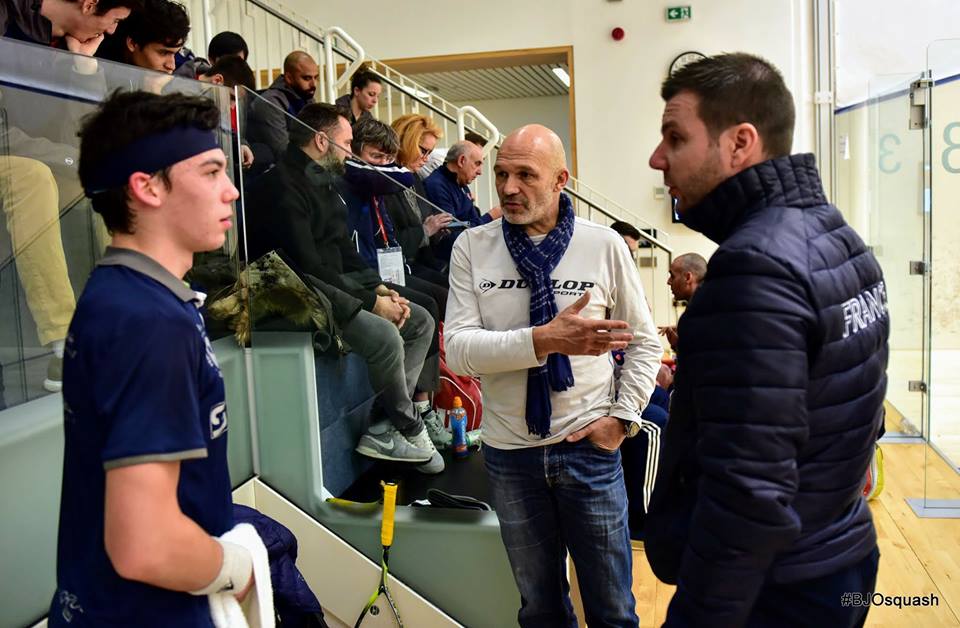
Victor Crouin (on the left), during the last British Junior Open alongside his father and national coach Renan Lavigne (Photo credit: #BJOSquash)
"I've known Victor since his first tournaments in the PACA region. He was a promising youngster, and was already very determined. I remember that I hit a few balls with him during a Regional Masters Championship 7 or 8 years ago, but now he would rather hit with me! Seriously, the thing I noticed when he arrived at the academy, and later at the National Centre in Aix-en-Provence, is his ability to optimize his time. He goes to the gym straight after a squash session, to cool down and to do his core strengthening and stretching routine. His career in juniors is exceptional, as shown by his list of titles in France and the way he's improved at the international level. The highlight was of course the World Junior Championship, even though he didn't get the gold medal at the end. His decision to go to Harvard for the next four years was well thought out. I can do nothing but approve, because Victor also excels in his studies. It will not hinder his progress, because he will discover a different culture and a new approach. We'll continue to follow and support him, through the French Federation. I've already discussed with his future coach Mike Way, whom I've known for a long time, and we'll be in touch regularly about Victor. He has not left yet, so I'll have the opportunity to tell him in person, but I wish him a lot of success in the US.”
CHAPTER 7 - THE RECIPE FOR SUCCESS
|
Don't neglect school ... As we already mentioned, Victor not only excels on a squash court but also in his studies. “Reconciling both is not straightforward, I won't deny it. But unless you are ill, not going to class is not an option. You have to make choices, especially regarding with your social life, so that you have more time for your sport. But if you are organized, motivated and thorough, it is possible. Making sacrifices is necessary and it's not always easy.” |
||
|
Learn how to communicate ... Another thing which Victor and his entourage pay much attention to is communication: he's even had a brand new website for a few weeks. “Initially, my father was writing for me and taking care of my communication. He taught me that it is paramount in a sport such as squash, which does not belong to the major ones. That was not easy for several reasons, especially the way other youngsters looked at me and their comments regarding my posts. When you are very young, it's not easy to build strong friendships, but as they get older people know how to find the right balance. As far as I am concerned, I completely accepted the consequences, because I knew it would convey a good image and positive values. If a youngster, or even an adult, is interested in my profile through the way I communicate, then I am satisfied. And if some of them want to start playing squash after having seen me play or talked to me, it's even better…”
Victor has understood the importance of communication for a long time... (Photo credit: Var Azur TV)
|
... and prevent injuries For more than 10 years, Victor is going from one tournament to another, whether it is on the junior or the professional tour, and has almost never got injured. Of course it has nothing to do with luck … “My first injury, which is still one of the rare ones to date, occurred in 2010 in the first round of the French Junior Open. I was up 2-0 and in the third game, I went to retrieve a lob. My left foot got stuck at the back of the court, and I pulled my left hamstring and wasn't able to go on court for two weeks. It was a nightmare to see all the other kids play while I couldn't put my foot on the ground. The fact that I am almost never injured is the result of the ground work and the solid foundations built by my dad/coach when I was younger, especially during the pre-season in the summer. I think it's one of the main reasons for my success. I've never been keen on hospitals, and I never go except for medicals. When I have a niggle, I try to sort it out by myself and I rarely go and see the physio. If I am really told to, I might go and see my preferred osteopath in Antibes, Virginie Fribourg (he laughs). I cannot imagine not being able to train for more than two days, and therefore it's difficult to guess how I'd feel like should I undergo a serious injury. The thing is, I do whatever it takes to prevent it from happening. And also, pursuing studies gives me other opportunities: if I were unable to play squash because of an injury, I'd be able to bounce back and do something else.”
... as well as this of a good recovery after training and matches (Photo credit: Victor Crouin) "The fact that I am almost never injured is the result of the ground work carried out with my dad."
|
|
“Playing squash and studying at the same time, promoting a good image through communication and preventing injuries: these are three fundamentals that any coach should teach to his players. They are key ingredients to success, but obviously you also need to perform on the court!” Victor Crouin
CHAPTER 8 - MY FATHER'S GLORY
|
One side of the mirror: Victor Crouin Victor's success cannot be separated from the role played by his dad Emmanuel, who's been by his side every step of the way, starting with his first steps on a tennis court. “A father/son relationship can sometimes be complex, and even more so if you add a coaching component to it. Very few athletes have had the chance to have a parent or a member of their family as their coach, and yet the examples of success are numerous: James Willstrop, Nick Matthew, the Williams sisters, Andy Murray, to name only a few. If my dad had never played squash, maybe I would never have heard of it. Even if he was very careful not to have any influence on my choices, I stopped playing tennis, which I loved – before going back to school in the afternoon, I would hit a ball against the garage door for more than an hour, in a way I played against myself. When you are young, the most complicated thing to understand is that once back at home your coach becomes your dad again, and the discussions – sometimes heated - which take place on the court cannot have an impact on the family life. Victor Crouin alongside his dad and his teammates in the Regional squad, Alex Dubarry et Benjamin Aubert (Photo credit: WSF World Juniors) My father was always very much involved in squash, whether with the kids at our club or within the region. As far as I am concerned, he constantly tried to learn new things in areas such as mental or physical preparation, with the sole aim of making me improve and become a complete athlete: to do so, he did not hesitate to inquire people who were sometimes more qualified. But above all, he spent and still spends countless hours with me on court, which is priceless! I am impressed with his ability to come up with new drills week after week. At first I wonder what they're for, and after a while I realize they are very useful... He's been a constant support over the years, whether it is in training or during matches. Even if he doesn't come with me as often as before on tournaments, we stay in touch – wherever I am in the world – thanks to streamings or through the phone. And it's good to be independent from time to time… He's the reason why I became the player I am today: I owe him all my titles during my junior career, and I do not think that I will find one day a coach who can replace him. Nevertheless, I've worked with other people, whether it was during gatherings or at European tournaments. Their approaches were different from the one my father had taught me. I've always listened and sometimes I agreed with them. It's always interesting to have different point of views, and I can't wait to learn on Mike Way's side, so that I can keep on improving. I am sure he's going to teach me a lot.” "I owe my dad all my junior titles." |
And the other one: Emmanuel Crouin What's his dad's view on Victor's career, and did he imagine he'd have so much success? Emmanuel Crouin talks about the special bond between his son and him. “Victor and his sister Emma are fraternal twins and were born very prematurely. Emma was in rather good health, but Victor was placed in intensive care. My wife and I took care of them for two months at the hospital of La Timone in Marseille before we were able to go back home. But during the first week after their birth, I stayed alone with Victor because my wife was at the hospital where she'd given birth with Emma. I believe that this very tough time was the foundation of a bond that goes beyond a normal father/son relationship. Emma and Victor first played baby tennis, and he instantly showed natural abilities, especially with the way he moved towards the ball. He liked it so much that besides his training sessions, we started playing together. But very quickly he joined me at squash, and I taught him the basics and then much more… Urged by Michèle Lecomte who saw in Victor a potential champion in the making, I started taking his training seriously, with 2 to 3 sessions per week. Results came quickly and I dedicated more and more time to it, calling upon people from other sports (football, tennis, skiing) for his physical and mental preparation. From the outset, we wrote the content of each session in a notebook, before moving on to electronic files. At first we didn't have a specific goal, if not make Victor work on his writing and become familiar with computers, then with English with his Facebook page. But it turns out it became a very useful tool later on. When he left to the national academy, we continued to exchange through this means on a daily basis. Thus, I could keep on following him and suggest things that were different from those he was doing in his training. That's when I first thought Victor had a good chance to succeed in squash, but since the career of an athlete is very short and uncertain, his mother and I were always strict about studies. To answer your question, despite his natural abilities for sport in general and particularly racket sports, I did not initially think that he would have such a career.” He may no longer be his full-time coach but Emmanuel Crouin is the key figure in Victor's career (Photo credits: Hibouweb, SiteSquash, Victor Crouin) Beyond his results, Victor always shows a great deal of respect for his sport and his opponents. How did his father teach these values to him? “Sport, especially competitively, often reveals the true character of a person, and from a very young age Victor showed he hated losing as well as injustice. I had to make him understand that losing is part of any sport: it was difficult and it still is a work in progress, luckily he doesn't lose too often! He improved a lot in the way he reacts after the referee makes a call, but if you watch his matches carefully, you'll notice that he almost always loses the point after having argued with the ref. These aspects of his personality have made him become more and more professional in his training, his preparation and his commitment during matches. I always told him that respecting your opponent means playing at your best, and if he bagels them sometimes, it is only the consequence of that. The way he respects others and his professionalism are values he displayed from a very young age and they are underlying in every single training session. Focus may be put on accuracy, speed or fighting spirit, but also on attitude: I see it as the reflection of a player's subconscious, and in a sport such as ours – that we could compare to boxing – it's essential to see the true face of your opponent, and to give a good account of yourself.” "From a very young age, Victor showed he hated losing as well as injustice."
|
Here ends our feature about Victor Crouin's junior career. If you want to keep following him, go to the links below:





